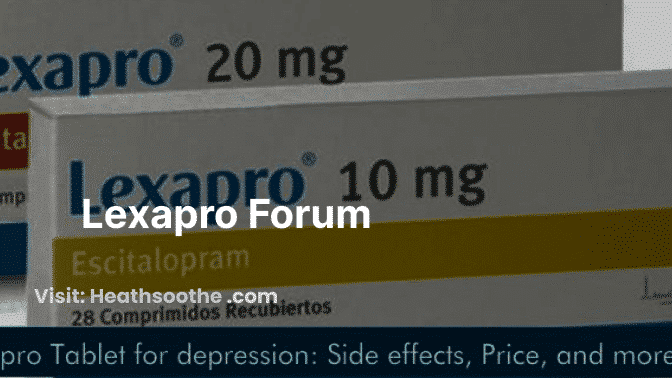Lexapro, also known by its generic name Escitalopram, is a widely prescribed antidepressant medication. It belongs to the class of selective serotonin reuptake inhibitors (SSRIs) and is primarily used to treat depression and anxiety disorders.
If you or someone you know is considering or already taking Lexapro, it's essential to have a comprehensive understanding of this medication.
In this article, we will explore the various aspects of Lexapro, including its usage, potential side effects, withdrawal symptoms, and more.
How Lexapro Work
Lexapro is a selective serotonin reuptake inhibitor (SSRI), which means it works by increasing the levels of serotonin in the brain. Serotonin is a neurotransmitter that plays a role in regulating mood, sleep, appetite, and other functions.
When serotonin is released by nerve cells, it binds to receptors on other nerve cells. This binding sends a signal that tells the other nerve cell to do something. After the signal is sent, the serotonin is usually reabsorbed by the nerve cell that released it. This is called reuptake.
SSRIs like Lexapro work by blocking the reuptake of serotonin. This means that more serotonin is available to bind to receptors on other nerve cells, which results in an increase in serotonin levels. This increase in serotonin levels can help to improve mood, sleep, appetite, and other functions.
It takes about 4-6 weeks for Lexapro to start working for most people. However, some people may start to feel better sooner. It is important to continue taking Lexapro even if you don't feel better right away, because it may take some time for the medication to reach its full effect.
Potential Side Effects of Lexapro
Lexapro, like any medication, can potentially cause side effects in some individuals. It's important to note that not everyone experiences side effects, and the severity and occurrence of side effects can vary from person to person. If you're considering taking Lexapro or are already using it, it's crucial to be aware of the potential side effects and discuss them with your healthcare provider. Here are some common and rare side effects associated with Lexapro:
Read Also: Essential Oils to Promote Relaxation Before Bedtime
Common Side Effects:
- Nausea: One of the most commonly reported side effects of Lexapro is nausea. This may occur initially but often subsides over time. Taking the medication with food or dividing the dose throughout the day can help alleviate this symptom.
- Headache: Some individuals may experience headaches while taking Lexapro. Staying hydrated and practising relaxation techniques can help manage this side effect.
- Insomnia or drowsiness: Lexapro can affect sleep patterns, leading to either difficulty sleeping (insomnia) or excessive drowsiness. If you experience these symptoms, discuss them with your doctor to explore potential solutions.
- Sexual dysfunction: Some individuals may experience changes in sexual desire or performance while taking Lexapro. It is important to communicate any concerns with your healthcare provider, as they may suggest alternative treatment options or adjustments.
Rare but Serious Side Effects:
- Suicidal thoughts: In rare cases, Lexapro and other antidepressants can increase the risk of suicidal thoughts, especially in young adults and individuals under 25. It's crucial to monitor your mental health and seek immediate medical attention if you experience worsening depression, suicidal thoughts, or unusual changes in behaviour.
- Serotonin syndrome: This is a potentially life-threatening condition that can occur when there is an excessive accumulation of serotonin in the body. Symptoms include agitation, rapid heartbeat, high blood pressure, fever, sweating, confusion, and muscle stiffness. If you experience any of these symptoms, seek immediate medical help.
Tips for a Smooth Transition
- Consult your healthcare provider: It is crucial to work closely with your doctor or psychiatrist when discontinuing Lexapro. They can provide guidance on the appropriate tapering schedule and monitor your progress throughout the process.
- Gradual tapering: Slowly reducing the dosage over time, under medical supervision, can minimize withdrawal symptoms. Abruptly stopping the medication can increase the likelihood and intensity of withdrawal symptoms.
- Communicate with your healthcare provider: Keep an open line of communication with your healthcare provider during the tapering process. Inform them of any withdrawal symptoms you experience, as they may recommend adjustments to the tapering schedule or suggest additional strategies for symptom management.
- Self-care practices: Engaging in self-care activities can help support your overall well-being during the transition. Get regular exercise, prioritize sleep hygiene, eat a balanced diet, and practice stress-reduction techniques such as mindfulness or meditation.
- Seek support: Reach out to friends, family, or support groups to share your experience and seek emotional support. Connecting with others who have gone through similar transitions can provide valuable insights and reassurance
Who should not take Lexapro?
Lexapro is a safe and effective medication for many people, but there are some people who should not take it. These include people who:
- Are allergic to Lexapro or any of its ingredients.
- Have a history of mania or hypomania.
- Are taking other medications that interact with Lexapro, such as MAO inhibitors?
- Are pregnant or breastfeeding?
- Have a history of suicidal thoughts or behaviours.
How to take Lexapro?
Lexapro is a medication that is taken by mouth once a day. It can be taken with or without food. The usual starting dose is 10 mg, but your doctor may adjust your dose as needed.
It is important to take Lexapro at the same time each day. This will help to keep your levels of the medication consistent. If you miss a dose, take it as soon as you remember. However, if it is almost time for your next dose, skip the missed dose and take your next dose on time. Do not take two doses at once to make up for a missed dose.
Lexapro can take up to 4-6 weeks to start working. It is important to continue taking Lexapro even if you don't feel better right away, because it may take some time for the medication to reach its full effect.
If you are taking Lexapro for depression, you should continue taking it for at least 6 months after you start to feel.
Conclusion
Lexapro forums can be a great resource for people who are taking Lexapro or considering taking it. These forums can provide information about the medication, its side effects, and how to take it. They can also provide a place to connect with other people who are taking Lexapro and share experiences.
However, it is important to remember that Lexapro forums are not a substitute for medical advice. If you are considering taking Lexapro, you should talk to your doctor about the risks and benefits of the medication. They can help you decide if Lexapro is right for you.


